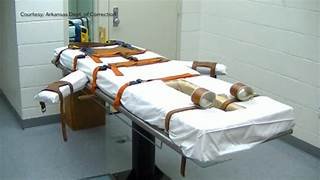The execution of a notorious American serial killer has been postponed due to a series of unsuccessful attempts at administering lethal injections. This development has reignited a debate over the reliability and ethicality of lethal injection as a means of capital punishment and has brought the death penalty back into the public discourse. This development has sparked a debate surrounding the use of lethal injection as a method of capital punishment and has reignited discussions about the death penalty in the United States.
The convicted serial killer, who was sentenced to death for his involvement in multiple murders, was scheduled to be executed by lethal injection. However, the execution was halted after eight attempts to administer the lethal injection failed. The failed attempts have raised questions about the effectiveness and reliability of lethal injection as a method of execution.
Lethal injection is the most common method of execution in the United States and is used in the majority of states that still carry out the death penalty. The procedure involves the administration of a series of drugs, including an anesthetic, a paralytic, and a drug that induces cardiac arrest. The aim is to induce unconsciousness and then stop the heart, resulting in death.
The use of lethal injection as a method of execution has been controversial, with critics arguing that it is inhumane and can cause unnecessary suffering. There have been several high-profile cases in which executions by lethal injection have gone awry, leading to prolonged suffering for the condemned individuals.
In recent years, there has been a growing movement to abolish the death penalty in the United States. Many argue that the death penalty is a cruel and outdated form of punishment that does not deter crime and is disproportionately applied to people of color and those who are economically disadvantaged.
The failed execution has reignited the debate over the use of lethal injection as a method of capital punishment. Some argue that the failed attempts highlight the inherent flaws in the use of lethal injection and demonstrate the need for alternative methods of execution.
Others argue that the use of lethal injection is still a viable method of execution and that the failed attempts were the result of human error rather than a flaw in the procedure itself. They point to the fact that lethal injection has been used successfully in the past and that it is the most humane method of execution available.
The failed execution has also raised questions about the role of pharmaceutical companies in the use of lethal injection drugs. Many pharmaceutical companies have refused to supply drugs for use in executions, citing ethical concerns. This has led some states to turn to compound pharmacies to obtain the necessary drugs, raising concerns about the quality and safety of the drugs used in executions.
The execution of a notorious American serial killer has been postponed due to a series of unsuccessful attempts at administering lethal injections. This development has reignited a debate over the reliability and ethicality of lethal injection as a means of capital punishment and has brought the death penalty back into the public discourse. The failed attempts have raised questions about the effectiveness and reliability of lethal injection and have sparked a broader discussion about the death penalty in the United States.









